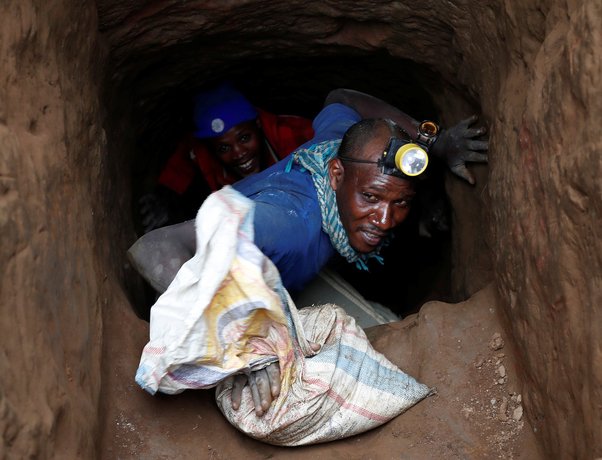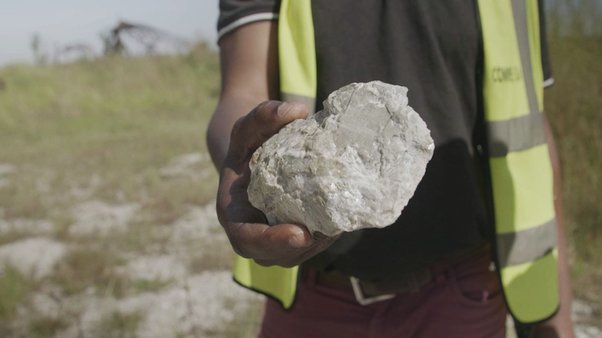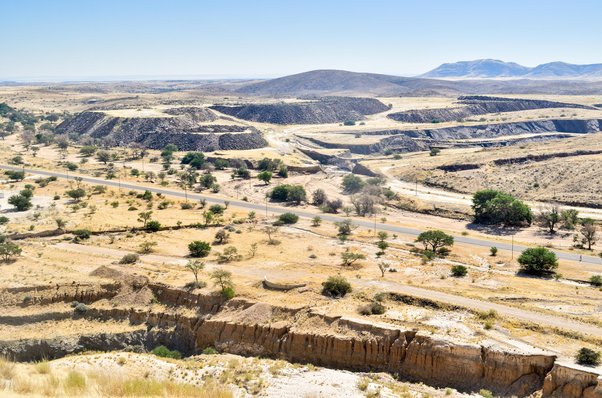A new Global Witness investigation indicates that international commodities trader Traxys has bought conflict coltan smuggled from Democratic Republic of Congo (DRC) to Rwanda
The investigation reveals that the multibillion-dollar company headquartered in Luxembourg bought 280 tonnes of coltan from Rwanda in 2024 based on customs documents seen by Global Witness.
Analysis of trade data and a testimony from two coltan smugglers suggest that a significant proportion of the coltan Traxys has bought from Rwanda is connected to the ongoing war in the east of DRC.
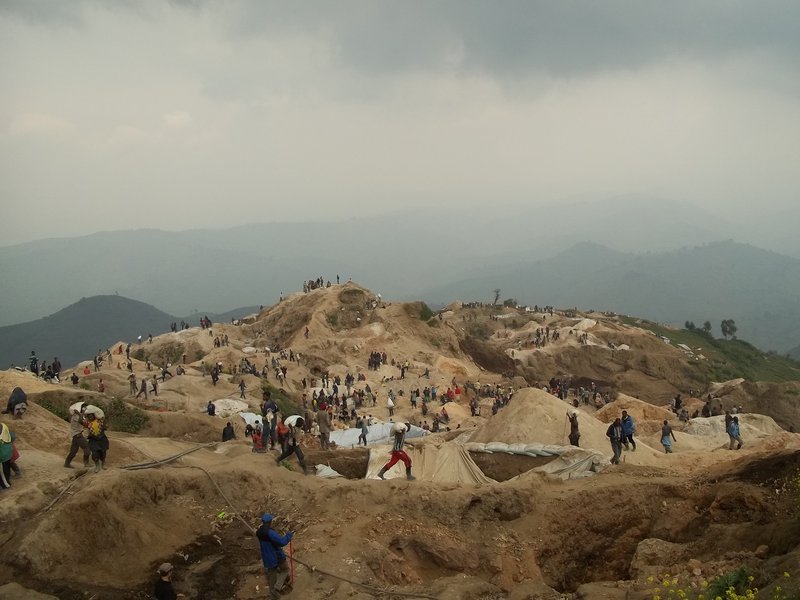
Mines in the Rubaya area, DRC, from which coltan has been smuggled to Rwanda in large volumes. Global Witness
Tantalum, a metal derived from coltan, is used in manufacturing electronics such as mobile phones, personal computers and automotive parts including for electric vehicles which are part of the energy transition. A mobile phone contains 40mg of tantalum on average.
In February, Rwandan-backed armed group M23 continued its warfare conquering Bukavu, a city of over 1 million and the capital of South Kivu province – just weeks after occupying Goma, the largest city in the East of Congo.
M23 is to an important part financed by exploiting coltan in the Rubaya area, which has been smuggled to Rwanda in large volumes. As detailed further below, Traxys denies that any of the coltan it exports from Rwanda was mined in Rubaya.
Our findings
- Traxys was the almost exclusive buyer of coltan sold by Rwandan minerals exporter African Panther Resources Limited, according to customs data seen by Global Witness.
- Two traders who illegally bring coltan from Rubaya in the DRC over the border to Rwanda told Global Witness that African Panther has bought smuggled coltan from Rwanda. One trader also said M23 demanded a tax of 15% of the selling price.
- African Panther's coltan exports soared to unprecedented volumes in 2024, exceeding the combined total of the export volumes recorded over the previous four years. This increase in exports coincides with the escalation of the war in North Kivu and increased smuggling of conflict coltan from Rubaya, further suggesting that an important share of African Panther’s 2024 exports was smuggled from conflict zones in DRC.
- Traxys has ramped up buying coltan from Rwanda in 2023 and became one of the biggest buyers of coltan from Rwanda in 2024. At the end of 2023 it was already clear that conflict coltan from the Masisi area was regularly smuggled to the country and laundered into supply chains, according to UN experts.
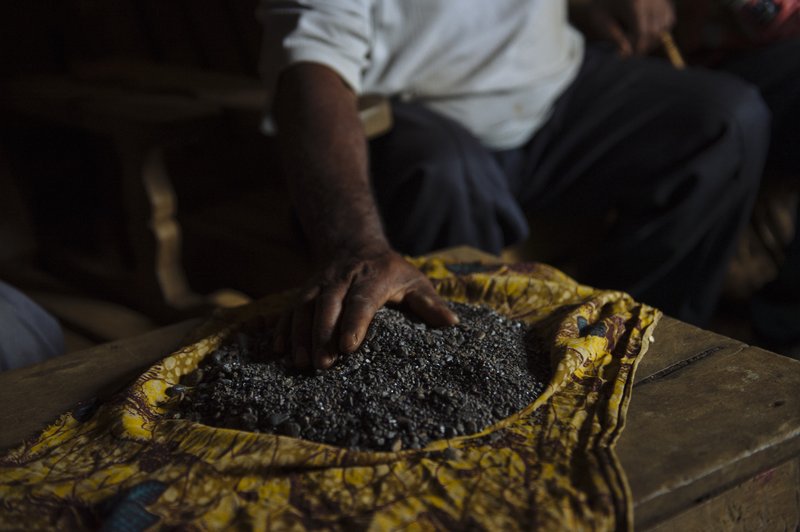
Tantalum, a metal derived from coltan, is used in manufacturing electronics. Phil Moore / Global Witness
Coltan connected to conflict
M23 has profited from coltan mined in Rubaya from early 2024 by controlling a major transport route, and by taking full control of the area’s mines that produce around 15% of the world’s tantalum. According to UN experts the ore trade has provided M23 a revenue estimated at US$800,000 per month.
By the end of 2023 the European Commission’s President von der Leyen discussed critical raw materials with Rwanda’s President Kagame. This led to a raw materials a strategic partnership which was signed in February 2024.
It is supposed to allow the EU to better access raw materials from Rwanda, including the coltan-derived tantalum, which the EU defines as a critical raw material. Yet this Global Witness investigation indicates that the EU has not developed sufficient safeguards to keep conflict minerals from entering its borders.
In February, the European Parliament slammed insufficient action to address the crisis in the DRC’s east. Commissioner Kallas, the EU’s top diplomat has since vowed that the minerals agreement will be reviewed.
The European Commission also sanctioned M23 leaders, Rwandan army officers and a company connected to human rights abuses in DRC on 17 March. Luxembourg, the country where Traxys is headquartered, is reported to have blocked these sanctions in the past.
Global Witness senior campaigner Alex Kopp said: “Our investigation strongly suggests that conflict coltan from DRC and smuggled to Rwanda has entered the EU. It seems that the EU has not been able to put effective safeguards in place and should immediately rescind its raw materials partnership with Rwanda.
“As major donors, the EU and its member states have considerable clout over Rwanda. The EU’s values and principles command it to freeze development assistance to Rwanda until Rwanda withdraws its troops from DRC and stops all support to M23."
Supply chain contamination
UN experts report that between May and October 2024 at least 120 tonnes of coltan have been smuggled monthly from Rubaya to Rwanda, leading to the “largest contamination of mineral supply chains” in the African Great Lakes Region recorded over the last decade.
Rwandan official figures show coltan exports have doubled from around 1,000 tonnes in 2021 to 2,000 tonnes in 2023. The rate of exports has further increased during 2024 when exports for the first quarter were record high, totalling more than 630 tonnes.
The UN and NGOs have pointed out that Rwanda’s mineral export figures do not correspond with its actual production, even before the latest surge in exports. The country has been accused of exporting looted and smuggled coltan from DRC for over two decades.
Seven thousand to 12,000 Rwandan troops fight alongside M23 in North and South Kivu whose fighting has displaced hundreds of thousands of people. The EU and its member states are some of Rwanda’s largest donors but official development assistance is at risk of being re-directed to fund the war, according to experts.
Companies respond
In response to the Global Witness investigation, Traxys denied that its coltan originates from Rubaya and helps fund M23, asserting that it is “firmly committed to working only with responsible supply chains when sourcing minerals from conflict-affected and high-risk areas.”
It also provided details of its due diligence measures, which include measures such as mine visits, plausibility checks, frequent communication with African Panther and knowing African Panther’s suppliers.
Global Witness notes that some of the companies Traxys named in its response as suppliers to African Panther have a checkered history of sourcing minerals from the region.
One of the companies Traxys claimed in its response was a supplier to African Panther was cited by a UN expert report in 2012 as selling minerals labelled as originating from a mine where no actual mining was taking place and another one was reported in 2008 of buying conflict minerals in DRC.
In its response to the investigation, African Panther denied that smuggled coltan from Rubaya was in its supply chain. The firm said it had visited 48 of its 70 suppliers in 2024, conducting mine inspections and risk assessment. However, it did not name any suppliers and has failed to answer Global Witness’ question from which mines it sourced its coltan.
African Panther referred to the COVID-19 pandemic and limitations in capital as reasons why its coltan exports were lower between 2020 and 2023, although Global Witness notes that African Panther’s coltan exports before COVID-19 were significantly below 2024 levels.
Traxys and African Panther both also asserted that they verify the origin of the coltan they buy by checking the ratio of tantalum and niobium, two elements of coltan. They say that coltan from Rubaya, referred to as “white coltan”, contains more tantalum and less niobium than the “black coltan” from Rwanda.
Traxys says that “[w]hen buying from African Panther, Traxys always appoints independent surveyors to sample and assay each lot and take photographic evidence of the color and appearance of the material.”
On this point, Global Witness notes that, according to an academic study, the tantalum grades vary widely across artisanal coltan mines in Rwanda and two geologists who have worked on conflict minerals in the African Great Lakes Region for several years told Global Witness that the same applies for niobium.
Furthermore, a UN group of experts report cited evidence in 2015 that, once in Rwanda, "white coltan" from DRC is routinely darkened or mixed with black coltan produced in Rwanda as a method of disguising the origin of smuggled minerals.
This account is supported by the two geologists, who told Global Witness that exporters could simply blend concentrates from different sources to achieve a desired target grade in an export shipment.
Traxys also said that all deliveries of coltan from African Panther to Traxys are tagged by “industry-accepted traceability providers.”
However, a 2022 Global Witness report found that the dominant traceability system in Rwanda, ITSCI, of which both Traxys and African Panther are members appears to have been widely used to launder smuggled minerals in Rwanda estimated to account for around 90% of exported tantalum, tin and tungsten in its initial years.
Recommendations
- Rwanda must immediately withdraw its troops from DRC and cease all support to M23.
- The EU should freeze its official development assistance to Rwanda, including the €900 million EU investment programme under the Global Gateway.
- The EU must rescind its strategic partnership on raw materials with Rwanda and any minerals-related strategic projects.
- The EU and other governments should consider further sanctions of commanders of M23 and senior Rwandan officials responsible for abuses as well as companies profiteering from conflict resources.
- The EU should stop support to Rwanda’s military operations in Mozambique.
- The EU should make company-based trade data publicly available for better transparency and accountability reasons.
- The EU should enforce its conflict minerals regulation.
- DRC and Rwanda should pursue negotiations in the framework of the Luanda and Nairobi peace processes.
- Companies along supply chains originating from the African Great Lakes Region should carry out due diligence according to the OECD Due Diligence Guidance for Mineral Supply Chains in Conflict-Affected and High-Risk Areas.
For full references, download the investigation.
Download full report: New investigation suggests EU trader Traxys buys conflict minerals from DRC
Download ResourceRead this page in
